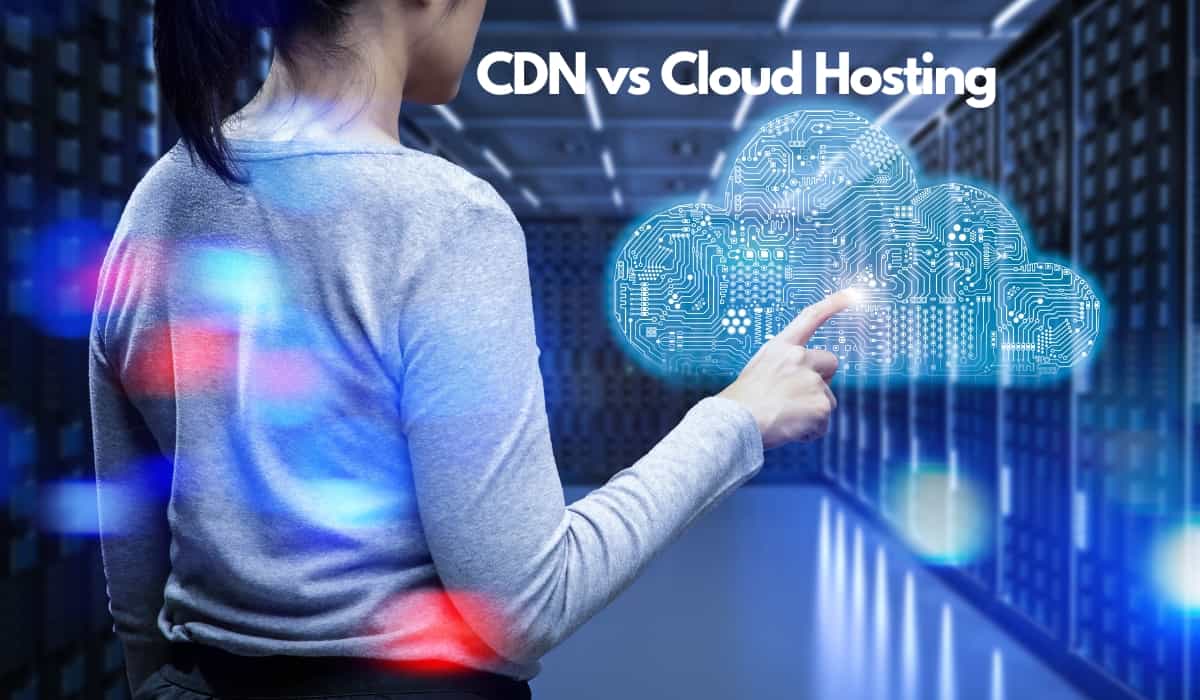In the demanding digital arena of today, where internet users expect web pages to load in no more than 3 seconds, the need for lightning-fast load times has never been more critical.
Did you know that a mere one-second delay in page load time can result in a whopping 7% reduction in conversions? That's right, to keep your audience engaged and satisfied, every second counts.
When looking to improve site speed, cloud hosting and Content Delivery Networks (CDNs) are two solutions you can turn to.
Cloud web hosting distributes website content across a pool of interconnected servers, thus ensuring high availability and optimal performance even during peak traffic spikes. Meanwhile, CDNs employ strategically placed servers, caching and delivering content to users as quickly and efficiently as possible, regardless of location.
This post will zoom in on cloud hosting infrastructure and content delivery networks. Jump in to discover how the two differ and how each option can help improve your website's performance.
What is Cloud Hosting?

Traditional web hosting plans (shared, VPS, & dedicated) store websites on a single physical server. With cloud-based hosting, however, your website is hosted and run on a network of servers.
Essentially, cloud web hosting replicates your website's content and spreads it across a cluster of virtual servers that draw their computing resources from underlying physical servers housed in a centralized data center and operated by cloud web hosting providers.
The main upside of cloud hosting is that it provides your website flexibility and scalability to adapt to changing demands and circumstances. You can easily adjust resources, such as processing power, memory, and storage, in real time to accommodate fluctuations in traffic, workload, or other factors. Conversely, during periods of low traffic, you can scale down your resources to avoid unnecessary costs.
Another crucial advantage of cloud-based hosting is that it employs redundant systems and failover mechanisms to ensure continuous accessibility of your website. In other words, cloud web hosting providers use various techniques and technologies to distribute incoming traffic evenly across servers, thus ensuring that none gets overloaded.
And if one cloud server in the network happens to fail or experiences hardware problems, the system automatically detects the issue and shifts your site's operations to another server. It all happens seamlessly, ensuring your website never experiences any downtime.
With its on-demand resources and ability to provide super-reliable uptime, cloud web hosting helps to ensure that your website remains responsive and delivers content quickly to users. As a result, it makes a great hosting option for website owners looking to maintain fast load times despite having heavy or changing workloads.
What is a CDN?

Much like cloud web hosting, a content delivery network service operates by mirroring static website content (files, scripts, images, & videos) and dispersing it across multiple networked servers. But instead of virtual servers, a CDN caches copies of your website onto physical servers (referred to as edge servers) positioned in strategic locations across the globe. These locations are dubbed Points of Presence (POPs) and are selected partly to bring content closer to end users.
When a user requests content from a website or application, the request goes to the nearest CDN server in the network. The server then collects the requested content from its cache and delivers it directly to the browser's device. This process reduces latency (the time it takes for data to travel between the host server and the end user's device) since the content is served from a server close to the end user rather than the origin server at a further distant geographical location.
Benefits of CDNs
CDNs come with the following benefits.
- Faster Load Times: By bringing content closer to users and cutting down on latency, CDNs improve load times, resulting in a superior user experience for visitors across the globe.
- Improved Bandwidth Efficiency: By caching content onto multiple servers and processing data locally, CDN edge servers help reduce the amount of data that needs to be transmitted over long distances. Furthermore, CDNs eliminate the need to retrieve content from the origin server hosting a website with each request, thus reducing the server's workload. These advantages work towards saving money on bandwidth costs and improving overall site performance.
- Enhanced Security: Edge servers also help to improve security by providing a smaller attack surface for hackers. Since less data needs to be transmitted to a central data center, this creates fewer points of entry for attackers to exploit.
- Global Reach: While a web host provider can have data centers in multiple locations, their extent does not come close to the scale of CDNs. With a large part of CDNs being about reaching a global audience, a content delivery network service can have its servers spread out in different continents, such as Europe, North America, Asia, and Australia, or major cities, such as New York, Tokyo, Sydney, and London. As a client, you will have the choice of POPs where your targeted audiences will likely be.
Cloud Hosting vs. CDN: Key Differences
Cloud web hosting and Content Delivery Networks both perform the function of ensuring website content reaches the end user upon demand. However, there is a clear-cut distinction between the two, each serving a different purpose.
In this next section, I'll highlight the key differences between the two.
Primary Function: Web Hosting vs. Content Delivery Service
Cloud web hosting provides hosting services tailored for small to medium-sized businesses, e-commerce websites, and startups looking to scale their online presence. It stores hosted website content on virtual servers and provides clients with control over their allocated server resources.
On the other hand, a CDN is all about delivering website content to end-users in the fastest possible time. It acts as a middleman between your website (already hosted on your web host's server) and the user, caching and delivering content from geographically distributed servers.
Area of Focus: Hosting Infrastructure vs. Content Delivery Optimization

Cloud web hosting's primary focus is providing the infrastructure (servers, storage, processing power, etc) needed to run your website and make it accessible online. It offers a dynamic hosting environment with scalable resources, flexibility in configuring your virtual servers (a.k.a. virtual machines or VMs) to your specific requirements, and an economical pay-per-use pricing model.
In contrast, the focus of CDNs is to optimize the delivery of your site's static content. Aside from caching content and reducing latency, CDNs utilize several optimization techniques, such as content compression, file minification, and image optimization, to facilitate quicker load times.
Mode of Content Distribution: Cloud Server vs. Edge CDN Server
Another distinction between cloud web hosting and CDNs is how the two models deliver online content. The former utilizes a cloud server, which is a virtualized server instance on a cloud computing platform. Unlike traditional physical servers housed in on-premise data centers, cloud servers exist in a virtualized environment. However, they draw their hosting resources from interconnected physical servers in a central data center.
Cloud servers function like typical servers, providing processing power, storage, and networking resources to run websites, applications, and other online services. They store copies of dynamic content, such as HTML pages, databases, apps, and user-generated content (e.g., comments or survey forms), and deliver it directly from the virtual server to users upon request.
Conversely, CDNs utilize what is known as an edge server to improve connectivity and speed. Also called a POP, a CDN server is usually placed at the edge of a network closest to the end users. These servers are also situated at exchange points between different networks, known better as Internet Exchange Points (IXPs).
Edge servers leverage their proximity to end users and prime position of closeness to high-speed and highly interconnected locations to facilitate super-fast content delivery. They store cached copies of static website content, ready to swiftly disperse them to users within the same geographical vicinity on request.
Over to You
Now you know the unmistakable differences between cloud web hosting and CDNs. While the two serve distinct roles, they can work well together, forming a dynamic duo that will elevate the performance of your website and enhance content delivery.
Setting up a CDN on your hosting is easy. All you only need to do is follow these steps.
- Sign Up for an Account: Create an account with the CDN provider of your choice.
- Add Your Website: Enter your website/domain in the CDN provider's dashboard.
- Change DNS Settings: Update your domain's DNS records with the provided CDN settings.
- Configure CDN Settings: Customize caching, security, and performance settings.
- Test Configuration: Ensure your website loads properly with the CDN enabled.
- Optimize Settings: Fine-tune settings based on performance metrics.
- Monitor Performance: Regularly monitor your website's performance and CDN usage.
- Optional: Install Plugins/Extensions: Install any available plugins/extensions for your platform (e.g., WordPress, Joomla) to optimize performance and manage CDN settings further from your CMS dashboard.
Are you searching for a reliable cloud hosting solution?
Experience lightning-fast performance and unmatched scalability for your website or app. With 24/7 support and top-tier security, your online assets are in safe hands.


